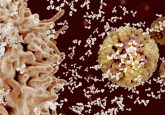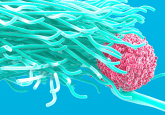Personalized treatment for patients with colorectal cancer: role of biomarkers

The systemic treatment of patients with colorectal cancer (CRC) has traditionally been based on clinical and tumor histological criteria. Recently however, several prognostic and predictive biomarkers have been proposed for patients with newly diagnosed CRC, including the subgroup with stage II disease. Among the best validated prognostic biomarkers for CRC are CEA levels, MS instability status and certain gene signatures. Although no biomarker currently exists for identifying patients likely to benefit from chemotherapy, the mutational status of KRAS and NRAS is used to predict response to cetuximab and panitumumab. For upfront identification of patients at high risk of suffering from severe therapy-related toxicity, specific variants of dihydropyrimidine dehydrogenase may be measured for predicting toxicity from fluoropyrimidines and uridine diphosphate glucuronosyltransferase*28 (UGT1A1*28) for predicting toxicity from irinotecan.
Click here to view the full article




